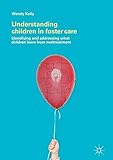Understanding Children in Foster Care [electronic resource] : Identifying and addressing what children learn from maltreatment / by Wendy Kelly.
Material type: TextPublisher: Cham : Springer International Publishing : Imprint: Palgrave Macmillan, 2017Description: XVI, 232 p. 1 illus. in color. online resourceContent type: text Media type: computer Carrier type: online resourceISBN: 9783319653761Subject(s): Psychology | Childhood | Adolescence | Social groups | Well-being | Children | Social service | Psychotherapy | Counseling | Child psychology | School psychology | Psychology | Psychotherapy and Counseling | Child and School Psychology | Social Care | Child Well-being | Childhood, Adolescence and SocietyAdditional physical formats: Printed edition:: No titleDDC classification: 616.8914 LOC classification: BF636.4RC475-489.2Online resources: e-book Full-text access
In:
Springer eBooksSummary: This book introduces the Relational Learning Framework (RLF), an assessment tool which helps foster care practitioners, social workers and foster carers to examine what foster children have learned in their early life about relationships and particularly through maltreatment. Grounded in attachment theory and drawing on cognitive theory this will help practitioners to understand and respond to the challenging behaviour presented by these children and remove barriers to empathic response. Early chapters provide context in a theoretical discourse on the causes and consequences of psychological and attachment difficulties for children in care, including a discussion of maltreatment and foster care. The theoretical basis of the technique will be outlined and subsequent chapters will explain how to undertake RLF including the wide-ranging practice evidence, a worked example, common themes and trouble shooting. This will be an invaluable source for clinical practitioners, social workers, foster care practitioners and foster parents who want to make sense of the complex information about children in foster care to improve their relationships. It will also provide insight into foster children's mental health and behaviour for academics and postgraduate students in related disciplines. .
TextPublisher: Cham : Springer International Publishing : Imprint: Palgrave Macmillan, 2017Description: XVI, 232 p. 1 illus. in color. online resourceContent type: text Media type: computer Carrier type: online resourceISBN: 9783319653761Subject(s): Psychology | Childhood | Adolescence | Social groups | Well-being | Children | Social service | Psychotherapy | Counseling | Child psychology | School psychology | Psychology | Psychotherapy and Counseling | Child and School Psychology | Social Care | Child Well-being | Childhood, Adolescence and SocietyAdditional physical formats: Printed edition:: No titleDDC classification: 616.8914 LOC classification: BF636.4RC475-489.2Online resources: e-book Full-text access
In:
Springer eBooksSummary: This book introduces the Relational Learning Framework (RLF), an assessment tool which helps foster care practitioners, social workers and foster carers to examine what foster children have learned in their early life about relationships and particularly through maltreatment. Grounded in attachment theory and drawing on cognitive theory this will help practitioners to understand and respond to the challenging behaviour presented by these children and remove barriers to empathic response. Early chapters provide context in a theoretical discourse on the causes and consequences of psychological and attachment difficulties for children in care, including a discussion of maltreatment and foster care. The theoretical basis of the technique will be outlined and subsequent chapters will explain how to undertake RLF including the wide-ranging practice evidence, a worked example, common themes and trouble shooting. This will be an invaluable source for clinical practitioners, social workers, foster care practitioners and foster parents who want to make sense of the complex information about children in foster care to improve their relationships. It will also provide insight into foster children's mental health and behaviour for academics and postgraduate students in related disciplines. .
| Item type | Current library | Collection | Call number | Copy number | Status | Notes | Date due | Barcode |
|---|---|---|---|---|---|---|---|---|
| E-Books | MEF eKitap Kütüphanesi | Springer Nature | RC475 -489.2 (Browse shelf (Opens below)) | Available | NATURE | 1419430-1001 |
This book introduces the Relational Learning Framework (RLF), an assessment tool which helps foster care practitioners, social workers and foster carers to examine what foster children have learned in their early life about relationships and particularly through maltreatment. Grounded in attachment theory and drawing on cognitive theory this will help practitioners to understand and respond to the challenging behaviour presented by these children and remove barriers to empathic response. Early chapters provide context in a theoretical discourse on the causes and consequences of psychological and attachment difficulties for children in care, including a discussion of maltreatment and foster care. The theoretical basis of the technique will be outlined and subsequent chapters will explain how to undertake RLF including the wide-ranging practice evidence, a worked example, common themes and trouble shooting. This will be an invaluable source for clinical practitioners, social workers, foster care practitioners and foster parents who want to make sense of the complex information about children in foster care to improve their relationships. It will also provide insight into foster children's mental health and behaviour for academics and postgraduate students in related disciplines. .
5
